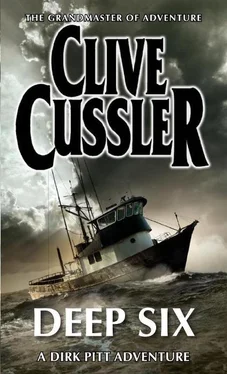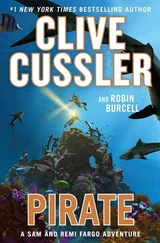Edgely nervously wiped his palms on a handkerchief. Greenberg stood slightly off to one side and behind him.
“We don’t want to break in during a thought pattern or in the middle of Lugovoy’s instructions,” Greenberg cautioned.
“I’m aware of that,” Edgely said without taking his eyes from the brainwave translator display. “Our computer transmission also has to match his heart rate and other life functions exactly.”
The programmer punched in the command and waited. They all waited, watching the empty screen that would reveal success or failure. The minutes ticked by, nobody speaking, the only sounds coming from the soft hum of the electronic hardware as the computer poised for the precise millisecond to take command. Then suddenly the display screen read: “COMMUNICATIONS TRANSFER ACCOMPLISHED.”
They all expelled a collective sigh of relief and began talking again, and shaking hands with the enthusiasm of a NASA flight control center after a successful rocket launch.
“Think Aleksei will fall for it?” Edgely asked.
“Don’t worry. No suspicion will ever cross his mind. Aleksei Lugovoy’s ego will never allow him to believe somebody pulled the wool over his eyes.” Greenberg paused to expel a smoke ring. “He’ll swallow everything we hand him and send it off to Moscow as if he was God’s gift to espionage.”
“I hope so,” said Edgely, dabbing at his sweating forehead. “The next step is to get the President over to Walter Reed Hospital and remove the implant.”
“First things first,” said Greenberg, producing a bottle of champagne as a staff member passed out glasses. The cork was popped and the wine poured. Greenberg held up his glass.
“To Doc Edgely,” he said, grinning, “who just set the KGB back ten years.”
Part IV
The Stonewall Jackson

August 13,1989
New Orleans, Louisiana
Pitt dozed most of the flight while Giordino manned the controls. The afternoon sun blazed from a clear sky as they dropped down over the blue-green waters of Lake Pontchartrain and lined up on the small airport that poked out from the New Orleans shore. The aquamarine-colored NUMA jet touched down on the asphalt landing strip and rolled to a stop near a helicopter with DELTA OIL LTD. painted on the side.
Nearby, a man in a seersucker suit stepped from a parked car and walked over. He removed his sunglasses and held out his hand as Pitt climbed from the Lear jet’s cabin.
“Mr. Pitt?” he inquired, white teeth gleaming in a tanned face.
“I’m Pitt.”
“Clyde Griffin, FBI, special agent in charge of the Louisiana field office.”
Giordino stepped to the ground and Pitt made the introductions.
“What can we do for you, Mr. Griffin?”
“Director Emmett asked me to state officially that the Bureau cannot provide official assistance on your hunt.”
“I don’t recall asking for any,” said Pitt.
“I said no ‘official assistance,’ Mr. Pitt.” The white teeth locked in a broad smile. “Unofficially, this is Sunday. The Director suggested that what field agents do on their day off is their business. I have eight men at my disposal who feel what you’re doing is more important than their golf game.”
“Emmett gave his blessing?”
“Strictly off the record, he strongly insinuated that if we don’t find the Vice President pretty damned quick, he’ll put a boot up my ass so far I’ll never sit down at the piano again.”
“My kind of guy,” said Giordino.
“Were you briefed on what we’re looking for?” Pitt asked.
Griffin nodded. “A river barge. We’ve already checked out about two hundred between here and Baton Rouge.”
“You searched north. I figure it to be south.”
Griffin stared down at the ground doubtfully. “Most all the incoming freighters and tankers unload at the city docks. Then the cargo is transferred north by tow-boat. Few barges ply the delta waters south except those carrying trash and garbage to be dumped in the ocean.”
“All the more reason to look in that direction.”
Griffin made an inviting gesture toward the helicopter. “My men are waiting in cars along the river front. We can direct them from the air.”
“Delta Oil make a good cover?” Pitt asked.
“Oil company whirlybirds are a common sight around these parts,” answered Griffin. “They’re heavily used to carry men and supplies to offshore rigs in the gulf and pipe construction throughout the bayous. Nobody gives them a second glance.”
Pitt excused himself and returned inside the NUMA plane, reappearing a minute later with the violin case. Then he entered the helicopter and was introduced to the pilot, a thin blond, dreamy-eyed woman who spoke in a slow, deep drawl. Pitt wouldn’t have taken her for an FBI agent, which she was, nor did she fit her name, “Slats” Hogan.
“Y’all play the violin when ya fly?” Hogan asked curiously.
“Soothes my fear of height,” Pitt replied, smiling.
“We get all kinds,” Hogan muttered.
They fastened their seat belts and Hogan lifted the craft into the air and made a pass over the heart of the city before turning south.
A tiny green streetcar crept along St. Charles Avenue, the tracks glinting as they reflected the sun through the trees. Pitt could easily make out the massive white roof of the Superdome, the largest sports structure of its kind in the world. The tightly packed houses and narrow streets of the French Quarter, the green grass of Jackson Square and the spires of the St. Louis Cathedral slipped past off to their right. And then they broke over the muddy brown-green waters of the Mississippi River.
“There it is,” announced Hogan. “Old Man River, too thick to drink and too thin to plow.”
“Spend any time on it?” Griffin asked Pitt.
“I conducted a historical survey a few years ago on a pair of Confederate Civil War wrecks about sixty miles further down river in Plaquemines Parish.”
“I know this great little restaurant in the parish—”
“So do I. The name is Tom’s. Excellent gulf oysters on the half-shell. Be sure and ask for Tom’s mama’s special chili pepper juice. Fantastic on the oysters.”
“You get around.”
“I try.”
“Got any idea where the barge might be hidden?”
“Keep an eye open for a dock and warehouse that appear run-down and little used, but well protected with heavy security — excessive number of guards, high fencing, perhaps dogs. The barge, rusted and in disrepair, will be stashed nearby. My guess is somewhere between Chalmette and Pilottown.”
“You can only reach Pilottown by boat,” said Griffin. “The delta highway ends ten miles above at a town called Venice.”
“I stand corrected.”
They went silent for a minute while the river below flowed along at almost four knots between the great levees that shielded the land from flood. Small farms with cows grazing in pastures and orange groves spread across the narrow strips of solid ground bordering the levees, before sliding away into marshland. They flew over Port Sulphur, with its great piers entrenched along the west bank. Small mountains of yellow sulphur rose fifty feet over the flat, poisoned ground.
The next half-hour produced the first of three false alarms. A few miles below Port Sulphur they spotted an abandoned cannery with two barges tied up beside it. Griffin radioed his team of agents, who were chasing the helicopter from the road on the west bank. A quick search proved the building to be empty, and the barges contained only bilge water and silt.
Читать дальше













